George Bernard Shaw
Was He the First?
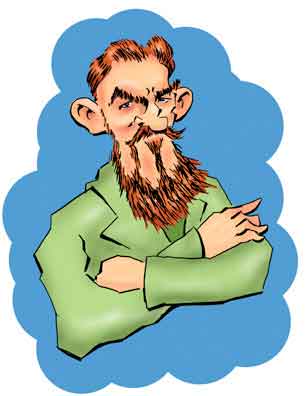
George Bernard Shaw
It's sometimes said that Shakespeare's plays were not considered literature anymore than television or movie scripts are today. That's why they were so popular. Going to the theater was like watching television.
This is not, though, quite correct. True, in the days of Good Queen Bess, the average Joe and Josephine Blow often paid a penny to go to the Globe. But Will's plays were not the equivalent of the boob tube. After all, you don't get the patronage of English royalty if you're writing episodes of My Mother, the Car.
There have always been mass entertainments that were more popular with the so-called lower classes than the upper crust. In Greece and Rome you had the games - Olympic and gladiatorial - that had far more attendance than the theaters. Even in later eras, when the common entertainment was cricket or baseball, gambling in the casinos, or attending a burlesque show, the theatah always maintained a higher brow luster.
But there was one man who did think Shakespeare's plays were no better than My Mother the Car. That was George Bernard Shaw.
And just who, you ask, was George Bernard Shaw?
For the first half of the 20th century, it's not unjust to call Bernard (as he preferred) the most famous playwright in the world. Although GBS (another euphemistic initialistic denotation) is less remembered today - at least in the US - it's a good bet that somewhere in the country you can go and watch one of his plays.
Despite his success - or perhaps because of it - Bernard - pronounced ber-NAHRD by Americans but BER-nerd in England - has his detractors. Why, his claim that Shakespeare stunk has less to do with the merit of William's plays than Bernard's own psychological make up and insecurities! Everyone knows that people who habitually take extreme minority views are trying to compensate for low self-esteem and feelings of inferiority. After all, if scholars who have devoted their lives to studying plays and theater are convinced Shakespeare is the greatest playwright in history, then if you go around telling everyone Shakespeare stinks, then you are in effect saying that you are smarter than the scholars who have devoted their lives to studying plays and theater.
But Bernard just didn't trash Shakespeare. He'd trash anyone. He loved to disagree with the majority, particularly if he could get a rise out of them.
Bernard especially loved trashing Americans. And by trashing the people whom the rest of the world saw as the most innovative and energetic people in the world - this was long before the world saw Americans as fat and stupid - Bernard was telling us that he was smarter than almost everyone else in the world. Actually, though, George said he really liked Americans and said, "I am not an American, but I am the next worst thing - an Irishman."
And indeed Bernard was born on July 26, 1856 in Dublin. All in all he had an unhappy childhood where neither parent paid much attention to him. His folks were lower level middle class - called "genteel poverty" back then - and although he attended secondary school, he didn't like it too much. His uncle stepped in to help supplement his education.
George's mom was named Lucidna and her marriage, like Bernard's childhood, was not happy. She had become fed up with her bibulous husband - also named George - literally from the day they were married. Truth to tell she had never liked him much even before that.
Bessie, though, did like a local music teacher named George Lee. She liked him so much that Bernard thought George might actually be his, Bernard's, real father. George had little formal education but possessed so much musical talent that he set up a music school and taught the Shaw children. George's - ah - "association" with the Shaws was all the easier since his school was just a couple of doors down from the Shaw's home. The kids themselves all had talent and George's sister, named Lucinda after her mom and called Lucy, became an excellent singer.
The possibility that George and Bessie enjoyed each others company was not suspected only by Bernard. Bessie's antipathy for her husband was well known and later a friend noted that the physical resemblance and personality of Bernard and George Lee was so great that she didn't doubt the parentage.
George had become so successful as a conductor, musician, and teacher that in 1872 he left for the more lucrative venues of London. A few days later - literally - Bessie moved too. Officially this was to help Lucy career as a professional singer, but we know (wink, wink) the real reason.
For a while Bernard remained with his dad and worked as a clerk (pronounced "clark" in the British patois). But four years later, he crossed the Irish sea and moved in with his mom and his sisters. Papa Shaw remained in Ireland and died in 1885.
With no television around, Bernard spent much of his time at the British Museum in a program of self-education. This was the time where education did not necessarily mean formal education, and George Lee, finding success in London as a musician, was able to get Bernard some work writing music criticism part-time for newspapers. He sometimes supplemented his pay with non-literary employment, including a stint with the Edison Telephone Company (yes, the Edison Telephone Company). But mostly Bernard lived off his mom and sisters.
Lucy on the other hand had developed into a professional singer of considerable skill. She sang in theaters and toured in stage productions. Then in 1883, she joined the D'Oyly Carte Opera Company which specialized in the operettas of Gilbert and Sullivan. Although not one of the major stars like Jessie Bond, she did play the lead female in performances in HMS Pinafore, the role of Josephine. Lucy also made some international tours as well and even appeared in New York on Broadway.
In 1886, Lucy married a D'Oyly Carte tenor, Charles Butterfield. Alas, Charles eventually forgot his family values to such a degree that in 1909 Lucy filed for divorce. In her later years, she became overly concerned about her weight and developed an eating disorder. She died of anorexia in 1920.
But in London and as accomplished singer Lucy was invited to the more fashionable homes. She was a frequent guest of Jane Francesca Agnes Wilde, who, like the Shaws, was originally from Dublin. But Lady Wilde had moved to London after the death of her husband, Sir William Wilde, who had been a well-known Irish physician and oculist.
Probably because he was Lucy's brother, Bernard was invited to tag along to the Wilde's. There in 1879 he met Lady Wilde's youngest son, Oscar, himself on the verge of achieving fame as a lecturer, writer, and playwright. The famous Monty Python skit notwithstanding, the two men, although always on friendly enough terms, saw each only occasionally. Later Oscar sent Bernard tickets to his new play The Importance of Being Ernest which in general Bernard did not like.
By the mid-1880's Bernard was writing music criticism for various newspapers. Because of his facile and easily read style, Bernard's articles stands out as fairly modern in a day when prose was often ponderous and long winded. But he did tend to make off-the-cuff remarks intended for effect whether they made any real sense or not. And the fact that he panned a number of plays - including what was then (and now) universally regarded as the one of the best light comedies in the English language - suggests to some that Bernard - then a remarkably unsuccessful playwright - was venting forth his sour grapes.
During his early years in London, George also became involved with a number of women. However, "involved" in our sense of the word apparently applied only to a friend of Bernard's parents who was sixteen years his senior. Bernard carried on with her for some years but he didn't neglect other friendships. In his other liaisons he seems to have largely avoided that most intimate of activities, which was likely more the decision of the ladies in a day where family planning was either non-existent or at best notoriously unreliable.
But being a part-time music critic only takes so much of your day, and George looked for other things to do. A popular pastime - then as now - was politics. So in 1884 George joined the Fabian Society, an organization that is virtually unknown in the United States but is still famous and active in England.
Modern articles tell us the Fabian Society is a socialist organization. But perhaps knowing that today the word raises a red flag - no joke intended - the Fabians refer to themselves as a "think tank". Even on their web page about their history, they use the word "socialist" only once and "socialism" not at all. But since Bernard joined the Fabians long before Norman Tebbit's "Let's-Roll-Back-Socialism-Even-Further" speech, he became a staunch and non-apologetic socialist.
As Bernard eased into the profession of journalism, naturally he began to harbor more lofty literary ambitions. After all, if you could write a few best sellers, you'd be set for life. By 1883, Bernard had written five novels of which none were yet published.
Another possible literary venue was the theater. Writing plays could be as lucrative as writing novels since this was the era of the repertory theater where plays were changed frequently - sometimes every day. The market for new plays was high and in a big city like London you could see a new play every night.
Sadly, the age of the repertory companies was to soon end - they were way too expensive compared to staging a single play for longer runs. But a hit play could still make the author rich. Bernard's first couple of plays went nowhere, but in 1892, at age 36, Bernard was able to get his play, Widower's House - performed. It went virtually unnoticed, although you'll still see it occasionally staged today.
As the millennium approached - 1898 actually - Bernard married a lady named Charlotte Payne-Townshend. All in all people believe it was a platonic relationship - Bernard and Charlotte never had any kids - and there were times that Bernard's tendency to have other lady friends put a strain on on their relationship. Mostly, though, it was a happy marriage, particularly for Bernard. Charlotte, it turned out, was rich.
It was also in 1898, that Bernard published a volume of his plays which had the text of Arms and Man. This play, which had been performed in 1894, finally achieved popularity with the public if not with Bernard's fellow critics. His reputation grew until in 1905 the New York Times called him the "well-known playwright." That was also the year Bernard really hit the big time with two plays: Man and Superman and especially Major Barbara. Eventually he wrote over 50 plays.
As you expect from such a lengthy list of oeuvres, only a handful can be considered "famous". These are Man and Superman and Major Barbara, of course, but also Heartbreak House, Saint Joan, Androcles and the Lion, Mrs. Warren's Profession, Caesar and Cleopatra, The Doctor's Dilemma, Candida, and of course, Pygmalion.
Sadly, we have to say that although Bernard's play are still performed - there are, after all, GBS organizations around - they have not achieved the status - or popularity - of Shakespeare. When staged with a good cast, Will's plays are enjoyable and can be a good night out. A modern staging of Much Ado About Nothing at a small neighborhood theater was so well performed that the locals broke into applause after every scene. But a recent performance of Pygmalion at a nationally known and prestigious theater was pretty much panned. And Pygmalion - for better or worse - stands second fiddle to its non-Shavian musical adaption, My Fair Lady.
Part of the problem is Bernard was trying to write great literature. Shakespeare wasn't. So William stuck with plots that everyone can relate to regardless of the time and society. Bernard, though, focused on writing about the social problems of his time. As time recedes, William's plays remain fresh, and Bernard's become period pieces.
We are speaking, of course, over a century and a half after Bernard's birth. With the first two decades of the 20 century, Bernard's reputation stood second to none, and in 1925, he won the Nobel Prize for Literature. His first inclination was to turn it down, but the usual story is Charlotte urged him to accept. After all, if you turn down the prize you don't get the money, something the French philosopher, Jean-Paul Sartre later leaned to his regret. George was well-aware of the value of money, but in this case, he donated the money to a worthy cause.
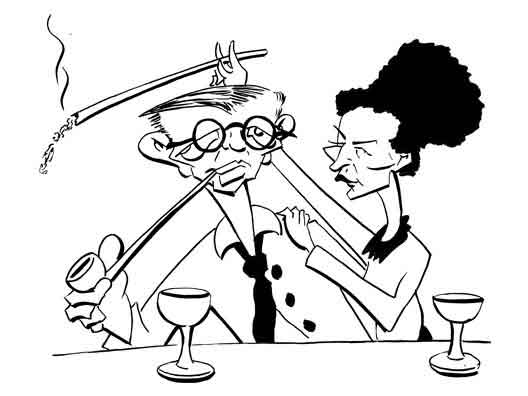
Jean-Paul Sartre
He learned.
It was also in the 1920's that Bernard and Charlotte met a young war veteran who had recently taken a research fellowship at Oxford. That was Thomas Edward Lawrence, recently made famous by the lectures, films, and books of Lowell Thomas.
Bernard and Charlotte in some ways became substitute parents and in 1927 T. E. legally changed his surname to "Shaw". He had been uncomfortable with the name "Lawrence" since the name was only assumed by his father, Thomas Chapman, to hide the fact that Father Lawrence had fathered T. E. and his four brothers by the boys' nanny. It was also a good way to avoid the publicity that T. E. had come to abhor. But we have to admit that "Shaw of Arabia" doesn't quite cut it.
After Bernard won the Nobel Prize, most of his contemporaries were dead or aging past usefulness. But Bernard was just getting started. In the 1920's and 1930's, he wrote not just more plays, but articles, books, and he loved to give lectures and interviews. By 1940, the whole world had long known who George Bernard Shaw was.
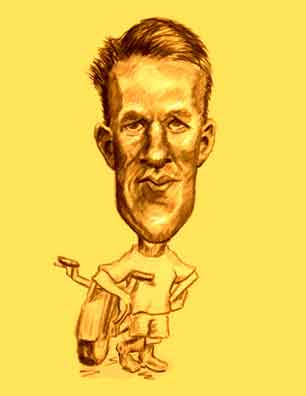
T. E.
"Shaw of Arabia" doesn't quite cut it.
But it was also in the 1920's and 1930's that we learn to our distress that Bernard developed a major - some say unforgivable - failing. This was his admiration - some say infatuation - with the despicable thug later turned Italian dictator Benito Mussolini. And even worse his admiration spilled over to who was arguably the most evil man in history, Adolf Hitler. This, though, is at least what we learn from Bernard's Bashers.
And the proof?
In 1928, Bernard came to America. He was filmed by the famous newsreel company, MovieTone. And just look, the Bernard-Bashers say, how he walks to the camera and praises Benito.
I think [Bernard said] in justice to Signor Mussolini, I ought to tell you that he has a very wonderful hair, he has a wonderful brow that comes down to here, that the difficulty is he can't take it off. Now if you watch me I can put on a threat imposing look that terrifies. The Mussolini look. Now just watch. I can take it off. Now Signor Mussolini cannot take it off. He is condemned, although he is a most amiable man. He is condemned to go through life with that terrible and imposing expression which really does a great deal of injustice to his kindly nature. But I can put it on and I can take it off and do all sorts of things.
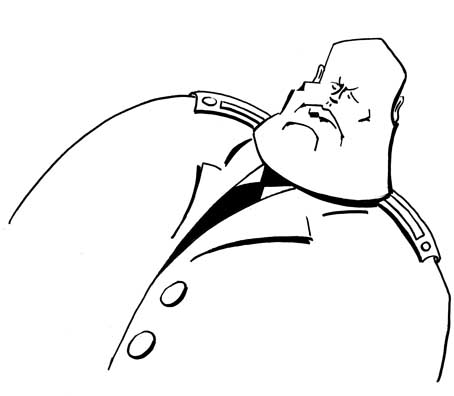
Benito
Was Bernard a fan?
Ha? (say Bernard's Fans, inadvertently quoting Shakespeare.) This speech is considered praise of Mussolini? Why any dunderhead can see that Bernard is just mugging for the camera and is in fact ridiculing the Italian dictator.
But hold on, the Bernard-Bashers respond, read what your hero said in an article titled by an editor, "Mussolini: A Defence". ["Defence" is the British spelling, not a misprint]. Here Bernard wrote:
To say that Fascism's success was due to castor oil was infantile. If it's so easy, why do not the Communists establish a dictatorship? They have plenty of castor oil.
Huh? Castor oil?
But wait a minute, the Bashers say. Bernard goes on to say:
I consider that Mussolini's military prestige did for Italy after the war what Napoleon's did for France in the time of the Directorate. If we compare Italy with Mazzini's Utopia, it is full of abuses, but it is like America, France, England, and Russia. To argue against fascism by citing the assassination of Signor Matteotti is like citing the murder of [Saint Thomas] à Beckett as an argument against feudalism."
Giacomo Matteotti was an opponent of Mussolini who was kidnapped and murdered after he had published anti-Fascist books. That he was killed by Italian Fascists is really not to be doubted and although some doubt the murder was on Benito's orders, it is definite that Benito approved of it and took no action to find the killers. So saying that you shouldn't criticize Fascism because its leader sanctioned violence against his opponents is a horrendous stretch of logic.
Besides, say Bernard's Fans, if you're going to trash Bernard for - quote - "being a fan of Mussolini" - unquote - let's read what a universally praised  public figure said almost exactly the same time:
public figure said almost exactly the same time:
That guy Mussolini is the smartest man in the world. Now I am not kidding, I honestly believe it. I have never yet, and I dare anyone to point out to me one move, or decree, that he has made that wasn't absolutely founded on common sense.
I have been in eight republics in the last ten days, including our own, and every one of 'em ought to be under Mussolini.
If he [Mussolini] died tomorrow Italy would always be indebted to him for practically four years of peace and prosperity.
You never saw a man where as many people and as many classes of people were for him as they are this fellow. Of course he has opposition, but it is of such a small percentage that it wouldn't have a chance to get anywhere even if they would let it pop its head up.
Dictator form of government is the greatest form of government there is, if you have the right dictator. Well these folks have certainly got him.
That say Bernard's Fans, is what Will Rogers - yes, Will Rogers - said in praise of Benito Mussolini. In fact, during all of the 1920's and into the 1930's, Will was one of Benito's biggest fans. He had actually met and interviewed the Italian dictator and came away impressed.
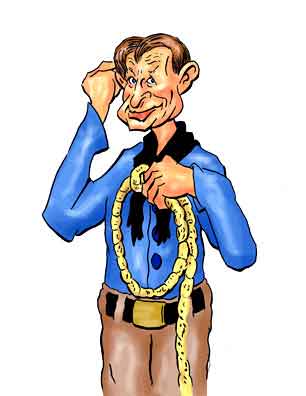
Will Rogers
He was impressed.
The problem for both Will's fans and Bernard's Bashers is that these so-called statements of praise were in the 1920's and early 1930's. A perusal of letters to the editors in contemporary newspapers and magazines shows us a surprising number of Americans saw Benito as a strong leader who had pulled Italy out of economic disaster. And for years he was even seen as an opponent of Hitler, not a surrogate.
And to the mid-1930's, Adolf had yet to be the power-hungry designer of the Anschlüß who would soon invade the rest of Europe and become the drug-addicted architect of the Endlösung. Instead, he was a comedic carpet-chewing nutball to be parodied and ridiculed.
But wait a minute say Bernard's Bashers. You say Bernard was opposed to Adolf? Then explain the film clip where Bernard said:
I think it would be a good thing to make everybody come before a properly appointed board just as he might come before the income tax commissioner and say every 5 years or every 7 years. You must know half a dozen people, at least, who are no use in his world, who are more trouble than they are worth, just put them there and say, "Sir or madam, will you be kind enough to justify your existence. If you can't justify your existence if you're not pulling your weight or if you're not producing as much as you consume or perhaps a little bit more then clearly we cannot use the big organization of our society for the purpose of keeping you alive. Because your life does not benefit us and it can't be of very much use to yourself."
Ha? (Again Shakespeare.) Is Bernard proposing extermination of "undesirables"?
The Bernard-Bashers say yes. After didn't he later say:
I appeal to the chemists to discover a humane gas that will kill instantly and painlessly. In short, a gentlemanly gas deadly by all means, but humane, not cruel.
This sounds bad. Not only does Bernard show massive ignorance of chemistry - there has always been such a gas - but surely this shows us that Bernard was a brutal and inhumane eugenicist.
A eugenicist, for those who have not heard this now somewhat rarely used word, is someone who thinks the human race should be improved genetically. In its more extreme forms eugenicists hold that the less desirable should be culled from the species.
This sure sounds like Adolf. So we've just proven that Bernard and his socialistic buddies actually were Nazi sympathizers, right?
Weeeeeelllllllll, not quite, say Bernard's Fans.
The truth is before World War II, eugenics crossed party and ideological lines as easily as money from Wall Street. It was in fact considered a far-seeing and humane doctrine. You can find - quote - "liberals" - unquote - who thought eugenics was fine. And you can then go and find - quote - "conservatives' - unquote - who were equally as enthusiastic.
In fact, the bipartisan list of eugenicists is large and reads like a veritable Who's-Who of 19th and early 20th century celebrities. The lists includes the author of The War of the Worlds H. G. Wells, English Prime Minister Winston Churchill, economists John Maynard Keynes, telephone inventor Alexander Graham Bell, birth control pioneer Margaret Sanger, financier John D. Rockefeller, robber baron Andrew Carnegie, writer Virginia Woolf, automobile manufacturer Henry Ford, American President Theodore Roosevelt, the pioneering aviator Charles Lindbergh, and cornflakes champion and opponent of self-stimulation, John Harvey Kellogg. We also have to be mindful that despite the criticism directed at Bernard and his liberals, in the 20th century thirty-two of the fifty United States passed eugenics laws and resulted in involuntary sterilization of 20,000 people in California alone.
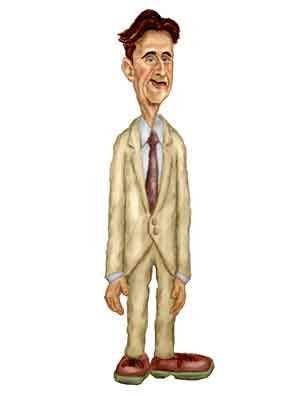
George Orwell
He didn't agree.
So we see that a major error is to think that Bernard spoke for the left. In fact, some socialists thought the man was bananas. One of those was the socialist writer George Orwell.
George was perplexed by Bernard. In one of his famous essays, George pointed out how both sides of the political spectrum tended to tolerate dictators who were on their own side of the Left-Right Fence. Left-wingers approved of Stalin and Russia but hated Germany. The right-wing extremists tended to excuse Germany's atrocities and hated Stalin's dictatorship and purges. But Bernard, George wrote, considered Stalinistic Communism and Hitler's Fascism the same thing and approved of both. George, by the way, was one of the few socialists who, like mathematician and logician Bertrand Russell, hated both Fascism and Communism.
But lest we look like we're turning into hagiographic apologists for George Orwell, we have to admit he had some strange ideas as well. For some reason, George couldn't stand vegetarians, possibly because Bernard was one.
Bernard became a vegetarian in the early 1880's. Why is no secret and was - or at least Bernard said - for humanitarian (or rather animalatarian) reasons. G. K. Chesterton - who wrote the first book about Bernard - said Bernard claimed it was not because meat tasted bad but because eating meat was bad taste. Or as George himself put it:
My will contains directions for my funeral, which will be followed not by mourning coaches, but by oxen, sheep, flocks of poultry, and a small traveling aquarium of live fish, all wearing white scarves in honor of the man who perished rather than eat his fellow creatures.
But was this the same man who we just saw advocating killing "useless" people by gassing them? But anti-vegetarians will simply snort that this is part of Bernard's confused and insecure personality. It wasn't that Bernard liked animals. He was just hated people.
But George Orwell, normally an intelligent and thoughtful man, could rant and rave as much as anyone. And he couldn't help make digs at vegetarians. Consider this quote from his book, The Road to Wigan Pier which was about the miners of Midland England.
One sometimes gets the impression that the mere words "Socialism" and "Communism" draw towards them with magnetic force every fruit-juice drinker, nudist, sandal-wearer, sex-maniac, Quaker, "Nature Cure" quack, pacifist, and feminist in England.
True, George doesn't use the term "vegetarian" and trashes a goodly number of other groups. But if "fruit-juice drinker" - actually a good thing to be - isn't specific enough, later George went mention how the applicants to a school had to declare if they ate ordinary or vegetarian food. George then went on to rant:
This kind of thing is by itself sufficient to alienate plenty of decent people. And their instinct is perfectly sound, for the food-crank is by definition a person willing to cut himself off from human society in hopes of adding five years on to the life of his carcass; that is, a person out of touch with common humanity.
But that someone like George Orwell had crazy ideas, the Bernard Bashers maintain, does not refute the fact that Bernard was a Fascist sympathizer. Why he even praised the British Fascist leader, Sir Oswald Mosely, the leader of the "Blue Shirts". During one lecture Bernard tomed:
You will hear something of Sir Oswald Mosley before you are through with him. I know you dislike him, because he looks like a man who has some physical courage and is going to do something; and that is a terrible thing. You instinctive1y hate him, because you do not know where he will land you; and he evidently means to uproot some of you. Instead of talking round and round political subjects and obscuring them with bunk verbiage without ever touching them, and without understanding them, all the time assuming states of things which ceased to exist from twenty to six hundred and fifty years ago, he keeps hard down on the actual facts of the situation. While you pose him with the American question, 'What's the Big Idea?' he replies at once, 'Fascism'; for he sees that Fascism is a Big Idea, and that it is the only visible practical alternative to Communism - if it really is an alternative and not a halfway house.
Once more Bernard's Fans shake their heads wearily. Clearly once more we have a speech not to be taken seriously. True, Bernard comes off a unprepared, off the cuff, and rambling. And they concede it's not one of Bernard's best speeches. Even one of his friends thought it - and we quote - "a painfully incoherent rant about nothing in particular." But certainly he isn't taking any stand (pro or con) about anyone. Nowhere does he claim that he admires Sir Oswald at all.
Besides, Bernard's Fans add, how can you say Bernard had the minutest sympathy with the Fascist doctrines. The race hatred of Hitler, he said, was "stark raving nonsense" and he also said in an unusually straightforward manner:
There is not the smallest scientific ground for the notion that pink or olive men are any better cogenitally [actually Bernard meant "congenitally"] than brown, yellow or black men".
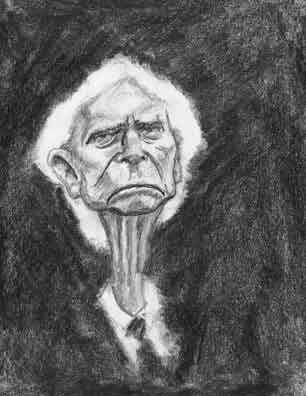
Bertrand Russell
Neither did he.
We should remember, say Bernard's Fans, that when Bernard talked of the "undesirables", he did not mean the poor or people with physical handicaps. For Bernard, the undesirables were the idle rich, the British aristocracy, that bred the prototypes of Bertie Wooster and the characters of popular British television shows about the Edwardian Era. Those who lived on inherited wealth did nothing for society.
In any case, Bernard's Fans tell us, he thought we should eliminate "unfit" people by educating them and by creating a society in which class lines were eliminated. In Bertrand's ideal world, everyone pitched in and worked and were paid commensurate for the importance of their labor.
Naturally, Bernard loved it when people took him seriously. For him it was a big joke. Unfortunately, Bernard didn't see what the future would bring, or that his bantering about having people justify their existence and having chemists develop a "painless gas" would not seem so funny nearly a century later.
Well, all this is well and good - until you read a perfectly serious and - for Bernard - well organized article in the Atlantic Monthly from 1948. This was near the end of Bernard's life, and he put forth his views on capital punishment.
Despite what the Bashers would assume for a bleeding heart socialistic liberal, Bernard was whole-heartedly in favor of capital punishment. Not that he didn't think we should try reforming criminals. If you can reform a criminal, by all means do so. But then he went on to say:
The real problem is the criminal you cannot reform: the human mad dog or cobra. The answer is, kill him kindly and apologetically, if possible without consciousness on his part. Let him go comfortably to bed expecting to wake up in the morning as usual, and not wake up.
For those who may think George is being euphemistic he clarifies his position:
But the ungovernables, the ferocious, the conscienceless, the idiots, the self-centered myops and morons, what of them? Do not punish them. Kill, kill, kill, kill, kill them.
Satire? Not, as Eliza Doolittle said, bloody likely. If you read the article it's clear that Bernard was speaking in earnest. From other comments and the tone you even wonder if he was advocating dispensing with a trial altogether. Certainly when he talks about killing "self-centered myops and morons", he's talking about killing off people to improve the human species.
We repeat that the article was not written as satire. Bernard was serious and his words fit perfectly with his statements of nearly twenty years earlier about eliminating undesirables and having the chemists develop a painless gas.
But we wonder. Would Bernard would have been pleased to find out that an upstanding, albeit follicularly challenged citizen of one of the more conservative United States did in fact advocate doing away with the trial for an accused criminal - and that this state has recently adapted the "painless gas" as an option for capital punishment? Sadly, we can't ask.
For decades few people seemed bothered by what Bernard said. It's not just that people were willing to forgive and forget - as they did for Will Rogers for praising Mussolini or Charles Lindbergh for advocating negotiations with Germany. Most people never even knew Bernard made any such comments.
But how could such opinions be kept from the public?
We forget that before the last decade of the 20th century obtaining information - including quotes, articles, and speeches of George Bernard Shaw - was difficult, time consuming, and expensive. But now with the touch of a button and from the comfort of your own home you can find not only his articles and speeches but also the newsreels where he spouts. Today it's a good bet that more people have seen the infamous film clips of Bernard or have read his article - call it a rant - on capital punishment than did so during his lifetime.
But sure, because Bernard may have held horrible personal views (which also contradicted with a lot of other things he said), it doesn't mean he didn't write amusing plays. In 1948 when he wrote the essay on capital punishment, he had three plays simultaneously on Broadway and Life Magazine had recently called him "the greatest living literary figure". Pygmalion had already been made into a film three times. And in the 1938 film, where the part of Henry Higgins was played by Leslie Howard and that of Eliza Doolittle by the elfin Wendy Hiller, Bernard even co-wrote the screen play. Although the film had rather a clumsy cinematographic opening, the picture won an Academy Award for best adapted screenplay. So we now have a favorite trivia question. Who won both a Nobel Prize and an Oscar?
Then in 1949, at aged 93, Bernard wrote one of his last and more amusing plays, Shakes versus Shav. This was a ten minute marionette skit featuring Bernard and his old nemesis, William Shakespeare. William, by the way, gets in the last word.
Even in his old age, Bernard remained active, vigorous, and mentally sharp. When he was 88 he had a visit from Bennett Cerf, the publisher of Random House and panelist of What's My Line. Bennett wanted to include Saint Joan in a collection of the best plays produced by the Theater Guild. When Bennett wrote Bernard (sounds like a movie title doesn't it?) Bernard responded "Absolutely not!".
But Bennett, armed with a letter of introduction - even then a rather archaic device to meet a famous person - found Bernard in his apartment getting along without any assistance. After some good-natured bantering that William Randolph Hearst should be made president, Bernard said he'd agree to let Bennett include Saint Joan if he'd get double the pay of anyone else. "After all," Bernard said, "without me, you have no book." When Bennett said that Eugene O'Neill's Strange Interlude was as important as Saint Joan, Bernard pointed out that Bennett was Eugene's own publisher and so Eugene would get the entire payment. Bernard would have to split his with his own publisher, Dodd, Mead. Bennett saw the fairness of the request and later wrote Bernard a most generous check.
On September 10, 1950, Bernard decided he'd prune a tree in his garden. He fell and broke his thigh. He returned home from the hospital in mid-October, and the news reports spoke of how amazing it was a man of 94 could recover from such an accident. Bernard died two weeks later, on November 2.
Bernard's fame remained high for decades after he died. It was only during the last decade of the 20th century that mention of his name began to fall off in newspapers and books. But Bernard's still cited today about as often as he was in 1940. That's pretty good although we're seeing a decided decline in how much we talk about the wit and wisdom of GBS.
So what can we say about a man who made a living by making outrageous statements, spouting off what were contradictory and at time horrible thoughts in print, during interviews, in live appearances, and later on film? If all that stuff sounds familiar, it should.
Yes, George Bernard Shaw was the first shock jock.
But even if Bernard's plays aren't performed as often as they were they have influenced other writers. Even before My Fair Lady there were films that directly and deliberately borrowed from Pygmalion. We don't mean just "fish-out-of-water" plots which can be traced back to the ancient Greeks. Instead we're referring to the story where one person bets another he can make cultured and elegant citizens from the lowest of the lower classes. We can think particularly of the two short films, Hoi Polloi and its remake Half-Wits Holiday.
Both starred the Three Stooges.
Yes, if Bernard was alive today, he'd be rolling over in his grave.
References
Bernard Shaw, Michel Holroyd, Four Volumes, Random House, 1988-1993.
The Search for Love, 1856-1898, Volume 1, 1988.
The Pursuit of Power, 1898-1918, Volume 2, 1989.
The Lure of Fantasy, 1918-1950, Volume 3, 1991.
The Last Laugh, 1950-1991, Volume 4, 1993.
Bernard Shaw: The One-Volume Definitive Edition, Michael Holroyd, Random House, 1998.
Socialism and Superior Brains: The Political Thought of George Bernard Shaw, Gareth Griffith, Routledge, 1995.
Try and Stop Me, Bennett Cerf, Simon and Schuster (1945).
"Shaw's Triumph", Life Magazine, p. 44, October 23, 1950.
"The Importance of Being Ernest", George Bernard Shaw, Saturday Review, February 23, 1895."Death of a Giant", Life Magazine, p. 44, November 20, 1950.
"George Bernard Shaw", Billboard, Magazine, November 11, 1950
"George Bernard Shaw: Can His Reputation Survive His Dark Side?", Leslie Evans, Boryanabooks, Web. February 1, 2012.
A Bernard Shaw Chronology, Anthony Gibbs, Palgrave Macmillan, 2001.
"Unwanted Sterilization and the Eugenics Programs in the United States", Lisa Ko, National Public Radio, January 20, 2016.
The Road to Wigan Pier, George Orwell, Victor Gollancz, 1937.
"Defence of Mussolini", George Bernard Shaw, The Argus (Melbourne), Friday, October, 1927, p. 15.
"Shaw on Shakespeare: Calls Him 'a Narrow-Minded Middle-Class Man'", New York Times, April 28, 1905.
"Capital Punishment", George Orwell, The Atlantic Monthly, Vol. 181, No. 6, June 14, 1948, pp. 51-52.
"YouTube Videos on Shaw", International Shaw Society, http://www.shawsociety.org/YouTube.htm.
International Shaw Society, http://www.shawsociety.org/.
MovieTone, http://www.movietone.com.
The Fabian Society, http://www.fabians.org.uk/.
"Lucy Carr Shaw (1883-85, 1886)", The D'Oyly Carte Opera Company, http://www.gilbertandsullivanarchive.org/whowaswho/S/ShawLucyCarr.htm